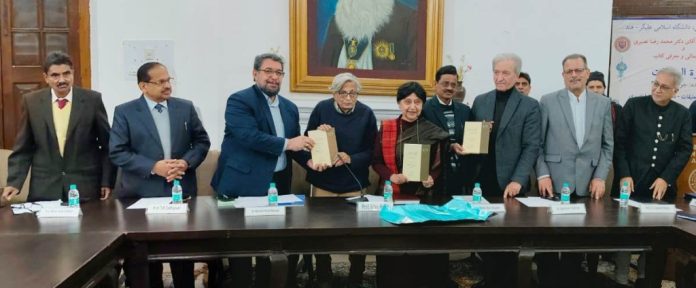Aligarh: Noted historian Irfan Habib, Professor Emeritus at Aligarh Muslim University (AMU) hoped that economic and cultural ties between India and Iran will deepen further, as both the countries have very old relations, in terms of culture, economy, language and many other aspects of life.
Releasing the fully annotated volume of “Tazkirat-ul-Waqiat”, a book written by Jauhar Aftabchi, who was in special service of Mughal emperor Humayun, about the life of the Mughal emperor, Prof Habib shed light on the ancient ties between India and Iran and common culture of the two countries. He said these relations are maintained even today through language and literature.
“Persian poetry owes a great deal to the influence of Persia and influence of Persian can be seen in all walks of life in India especially on culture and Indian languages,” he added.
Prof Irfan Habib congratulated Dr. Mohammad Reza Nasiri, Academy of Persian Language and Literature, Tehran, Iran for coming up with a fully annotated volume of the book which is one of the very important primary sources of the Mughal era history.
The book release function was organised under the aegis of the Institute of Persian Research, Aligarh Muslim University (AMU).
The chief guest Dr. Qahraman Soleimani, Director of the Persian Research Centre, Khanae-Farhang, New Delhi said Indian writers have created such rare masterpieces in a simple style of writing that are not even found in Iran. He discussed the academic contributions of the Indian scholars in the sphere of literature, history, poetry and culture.
Earlier, while introducing the distinguished guests, Professor Azarmi Dukht Safavi, former Director, Institute of Persian Research, AMU mentioned the valuable scientific and literary services of Dr. Mohammad Reza Nasiri.
She called Dr. Nasiri the spiritual ambassador of India in Iran as he has edited and published many texts related to the history and culture of India, such as Tarikh-e-Feroz Shahi, Tarikh-e- Ferishta, Tarikh-e-Punjab, Tarikh-e-Elmi Nizam Shah, etc.
Professor Safavi said Tazkirat-ul-Waqiat, written by Jauhar Aftabchi, is a very important historical source of Humayun’s era. Since its author was in the special service of Humayun, he is an eyewitness to many historical events. It has information about Humayun’s journey to Iran not found in any other source. The book records in detail all the royal ceremonies and rituals that indicate the special relationship between Iranian Shah Tahmasp Safavi and Humayun.
Professor Asim Siddiqui, Department of English spoke extensively about the English translation of Tazkirat-ul-Waqiat.
He discussed the genre of the book, especially Jauhar’s role as a deuteragonist. While talking about its English translation in 1832, he compared the favourable remarks of Charles Stewart, its translator, about Oriental literature with unsavory remarks of Macaulay three years later.
Professor Syed Ali Nadeem Rezavi, Department of History, AMU called the book the most important source to know about Emperor Humayun.
Both Professor Rezavi and Professor Siddiqui discussed the problem of the lack of any information about the real identity of Jauhar. They also discussed the text in relation to biographies of the Sufis.
Professor Karim Najafi Barzagar shed light on the importance of the Tareekh-e-Shahiya Nishapuriya and the usefulness of its manuscripts.
Professor T.N. Satheesan, Dean, Faculty of Arts, AMU congratulated the Institute of Persian Research for organising a discussion on a seminal historical text.
Dr. Mohammad Reza Nasiri highlighted the historical importance of Tazkirat-ul-Waqiat.
Earlier, Professor Mohammad Usman Ghani, Director, Institute of Persian Research delivered a welcome address.
Professor Azarmi Dukht Safavi and Professor Mohammad Usman Ghani presented a plaque of appreciation to Dr. Mohammad Raza Nasiri in recognition of his academic, literary and research services.
Dr. Mohammad Ehteshamuddin proposed a vote of thanks.




